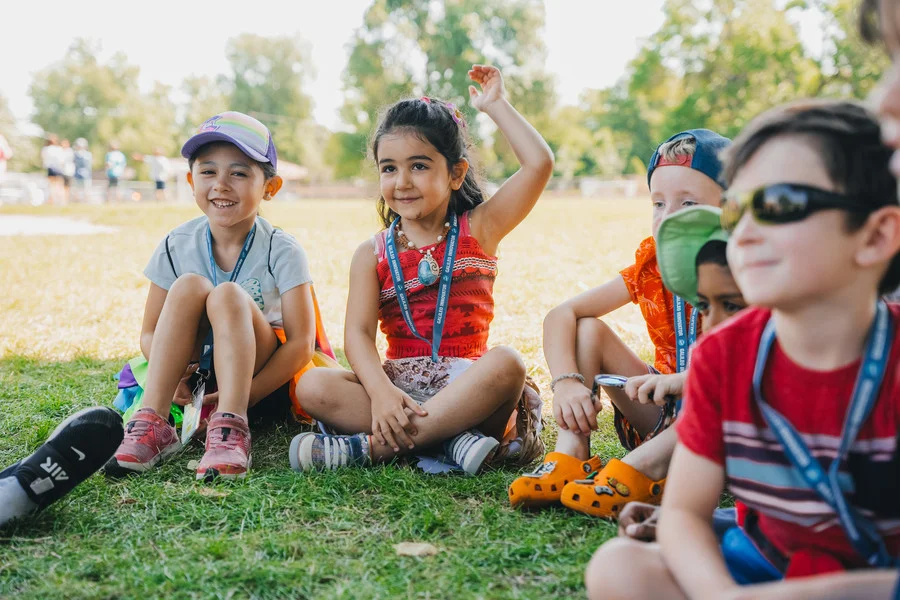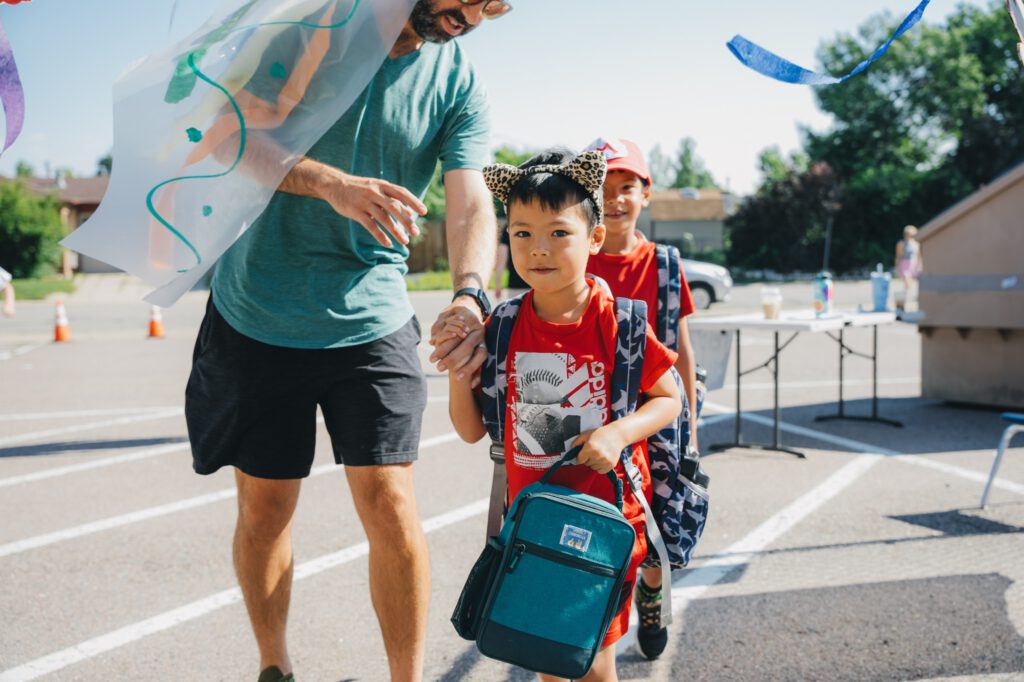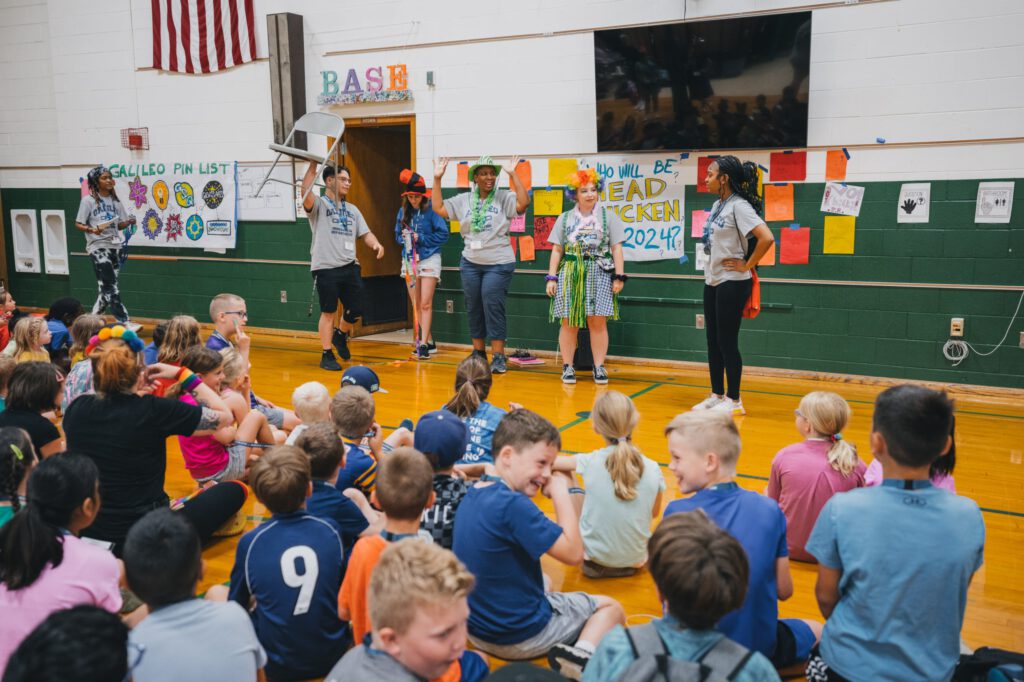Summer camp is a valuable, enriching experience for kids of all ages. It provides younger children with some of their first social interactions outside of family or school, developing their communication and interpersonal skills. As campers get older, they learn valuable life skills—like integrity, self-sufficiency and resilience.
By the time they’re teenagers, campers start learning hands-on concepts, practicing mentorship strategies and training to become leaders in their own communities. No matter a child’s age, summer camp promises valuable lessons and unforgettable fun.
What is the best age to go to summer camp? All of them! Camp offers benefits to children of all age groups, backgrounds and abilities. From kindergarten to high school, let’s explore how camp enriches children’s lives at every step of their development.
The Benefits of Summer Camp at Every Age
Children don’t stay the same as they age. They develop, learn and mature, gaining new interests, hobbies, skills and motivations as they get older. And, as kids grow, summer camp grows up alongside them.
The point of summer camp is to engage attendees, enrich their experiences and send them home more fulfilled than when they arrived. That’s why there’s no one-size-fits-all formula for summer camp across different ages—each program is tailored to its campers’ developmental level to foster:
- Learning – School is for education and camp is for fun—but that doesn’t mean kids don’t learn at camp all summer long. While rigorous academic coursework might feel different from the adventurous summer camp atmosphere, campers discover design principles, collaborative skills, Science, Technology, Engineering, Arts and Mathematics (STEAM) concepts and more through engaging activities and collective play.
- Creativity – Kids are natural creative masterminds. Studies show that rulebreakers—or kids who resist social guidelines and norms—display elevated levels of creativity in comparison to those who fall in line. While camp doesn’t promote negative behavior, it offers less stringent rules and more freedom than academic settings—creating the perfect environment for kids’ creative potential to flourish in a healthy, productive way.
- Confidence – Camp not only encourages kids to think outside the box, but also step outside their shells. It offers a variety of new experiences, ideas and relationships to explore, pushing kids to act for themselves as they navigate unfamiliar situations. The elevated freedom of choice at camp also strengthens critical thinking skills, boosting their confidence with every new step.
Camp Galileo incorporates these three focuses—plus problem-solving skills, resilience and much more—into every moment of our programs. From Nebulas (kindergartners to first-graders) to Counselors in Training (eighth to tenth-graders), Camp Galileo sets every camper up with fun and transformative enrichment.
Kindergarten – 2nd Grade: Building Confidence and Curiosity
Younger campers are just discovering the basics of social environments, like interacting with others and making friends. Since they’re still learning to interpret the world around them, they need closer supervision than other age levels and benefit from:
- Structured play – Whether it’s a hula hoop pass or relay race, younger kids need clear, defined rules to follow as they’re still new to self-sufficiency. Structured games encourage them to work together with other campers to achieve common goals—effectively building both their collaborative and social skills at once. Structured play also helps younger children develop their fine and gross motor skills. Plus, studies show it leads to more overall physical activity than free play.
- Hands-on learning – From creating obstacle courses to building the tallest towers possible, kids love interactive, hands-on activities. Reading, lectures and classwork are all too advanced for budding campers—plus they have no place in an engaging summer program. Game-based, hands-on learning, on the other hand, is shown to improve young children’s social, emotional and cognitive development more than standard academic curricula.
- Gentle socialization – For many younger kiddos, a summer at camp is their first time away from home, school and other familiar places. The newness can be a bit shocking —and that’s why counselors ease young campers into camp with plenty of ice-breaking games in a low-pressure, supportive environment. This gentle socialization allows kids to form bonds at their own pace without feeling scared.
In an inclusive, supportive environment, kids can quickly adapt and feel comfortable amongst their counselors and peers. Soon, this comfort grows into confidence and in turn, independence and decision-making.
3rd – 5th Grade: Strengthening Skills and Friendships
As kids reach elementary school, they gain higher situational awareness, advanced cognitive abilities and more social skills. They need to be challenged with novel ideas, engaging projects and increasingly difficult concepts to keep growing and developing.
Experiential learning is key for this level. In turn, summer camp fosters elementary-aged campers’ intellect and abilities with:
- Collaborative experiences – Elementary schoolers start grasping the value and necessity of collaboration. The self-centered tendencies that define early childhood give way to increased social interaction, teamwork and friendship. Camp helps foster collaborative development at this age with hands-on group activities—like collective sculptures and even dramatic puppet shows!
- Curiosity-driven projects – Elementary schoolers also start strengthening their sense of self. They begin to learn more about their own interests, hobbies and motivations. Summer camp offers kids the freedom to explore their passions and spend time doing what excites them. Whether it’s music, drama, visual art, engineering or something else, the wide variety of options fuels curiosity.
- More complex activities – Kindergartners and early elementary students need quick, achievable results to stay interested. Their projects take a day or so to complete and, as fun as they are, they’re simpler than older kids’ activities. Once kids reach Supernova status (fourth to fifth grade), longer attention spans and enhanced abilities give way to larger, week-long projects. They require more patience, but plenty of pride at the end.
Campers aren’t alone as they take on these complex activities and curiosity-driven projects—they’re surrounded by a support group of their counselors and peers encouraging them every step of the way. This collective environment makes it easy to socialize and make new friends—which, in turn, inspires campers to explore unfamiliar ideas, experience diverse viewpoints and discover new interests.
6th – 8th Grade: Leadership and Exploration
Middle schoolers are mastering self-sufficiency. They’re figuring out how to think for themselves and make responsible choices. To get the most benefit out of summer camp, they need activities that encourage:
- Critical thinking – By the time they reach age ten, most kids start to question the information from others, and instead rely on their own research to make conclusions. This is the essence of critical thinking—and summer camp fosters its development with complex projects that force campers to stop, think and plot out a plan before jumping into action.
- Creativity – Sadly, creativity levels tend to decline once students reach middle school. Busy schedules, higher academic expectations and digital distractions are often to blame—but luckily, camp clears the way for creativity to reemerge. Middle school campers are free to explore their creative sides through performances, innovative projects and whatever else piques their curiosity.
- Skill-building – Middle school is when kids really start ramping up their hard skills in preparation for high school and beyond. While summer camp encourages freedom, it never loses focus on core competencies like STEAM, problem-solving and collaboration.
Middle school can be an intimidating time for kids, but camp helps them navigate the increased social pressures of adolescence in a fun, supportive environment. This gives campers the confidence to take on more responsibilities and begin molding themselves into strong future leaders.
9th – 10th Grade: Mentorship and Personal Growth
By the time they reach high school, kids are ready to take on more challenging roles in their communities. The early teens is a prime age for burgeoning adults to become leaders and mentors to younger children—and camp helps build these leadership competencies as they work on:
- Communication – High schoolers learn that adult conversations are no longer just about getting your point across, but reading how the other party feels and reacting accordingly. By working with younger campers who don’t have the advanced communication skills they do, Counselors in Training (CITs) develop the patience, understanding and empathy they need to become effective leaders.
- Teamwork – Like communication, teamwork also becomes more multifaceted with maturity. When campers are young, their tasks are simple, their roles are assigned to them and they’re under careful supervision. By the time they reach CIT age, campers step up to resolve more difficult situations—such as unruly children, kids who don’t understand the rules and similar scenarios. This helps CITs develop more advanced collaborative skills like conflict resolution and delegation.
- Problem-solving skills – In facing new problems, high school campers add lots of feathers to their problem-solving caps. As they supervise younger kids, lead new projects, collaborate with their peers and co-manage programs for the first time, their field of vision widens—helping them confidently hop into any problem at camp or out in the world.
By acting as role models to younger kids, CITs inspire other campers while continuing to learn new abilities and innovate in a constructive, hands-on environment. The skills they develop at this age follow them into their school and personal lives and set them up for leadership success down the road.
The Best Age for Camp? Every Age!
What is the best age to go to summer camp?
Whichever age your child currently is! From kindergarteners to high schoolers, camp offers a variety of benefits at every age. It helps kids socialize, develop hard skills and transform into leaders within their own communities. Most importantly of all, it’s a place where kids grow, enrich their lives and have a ton of fun all the while.
At Camp Galileo, we prioritize collaboration, creative play and STEAM exploration to inspire kids to make their vision a reality. Confidence, resilience and a keen ability to think outside the box define our campers—as does the unforgettable fun they have as they experience the camp magic every single day.
Camp Galileo brings joyful, hands-on learning to kids across the country, with summer camps in Denver, Berkeley, Chicago and beyond. Wherever you are, there’s a place for your camper to discover new skills, make new friends and dream big this summer. Find a camp near you to enroll before summer hits. No matter your child’s age, adventure and growth await at Camp Galileo.
Sources:
- National Library of Medicine. Creativity slumps and bumps: examining neurobehavioral basis of creativity development during middle childhood. https://pmc.ncbi.nlm.nih.gov/articles/PMC6559841/.
- National Library of Medicine. Effects of Free Play and Partly Structured Playground Activity on Motor Competence in Preschool Children: A Pragmatic Comparison Trial. https://pmc.ncbi.nlm.nih.gov/articles/PMC9265359/.
- National Library of Medicine. Game-based learning in early childhood education: a systematic review and meta-analysis. https://pmc.ncbi.nlm.nih.gov/articles/PMC11018941/.
- National Library of Medicine. Children’s Critical Thinking When Learning From Others. https://pmc.ncbi.nlm.nih.gov/articles/PMC2951681/.





